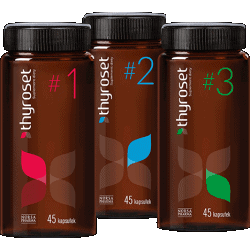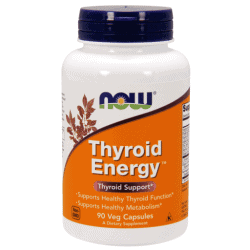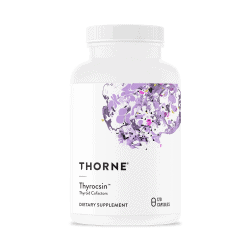.webp)
.webp)

Patryk Chodyniecki
Hashimoto - co wiemy o tej chorobie?
HASHIMOTO - CO WIEMY O TEJ CHOROBIE?
Tarczyca jest gruczołem znajdującym się w ciele człowieka. Jej prawidłowa praca tworzy liczne skutki dla funkcjonowania całego organizmu. W przypadku, gdy jej funkcjonowanie jest zaburzone, bardzo szybko dochodzi do powikłań, które odciskają swe piętno na ogólnej kondycji człowieka. Jeżeli pojawiają się problemy z tarczycą, to dochodzi do zaburzeń rytmu serca, rozregulowana zostaje praca jajników, co skutkuje nieregularnymi miesiączkami.
Są to co prawda skutki wewnętrzne, jednak hashimoto można rozpoznać po kondycji zewnętrznej organizmu. Skóra oraz włosy tracą swój blask, stają się suche, a nawet wypadają. Łysienie doprowadza do złego samopoczucia chorych osób, ponieważ dotyczy to głównie kobiet w średnim wieku. Nie dość, że są one narażone na menopauzę, to jeszcze występuje u nich problem z gubieniem włosów. Z tego powodu choroba hashimoto może jeszcze bardziej obciążyć nasz organizm.
HASHIMOTO - CO TO JEST?
Hashimoto jest najpopularniejszym rodzajem zapalenia tarczycy. Informacje dotyczące jej przebiegu mają wiele źródeł. Choroba ta może zostać uznana jako pierwotna przyczyna niedoczynności gruczołu tarczycowego. Bardzo często schorzenie występuje w połączeniu z innymi problemami autoimmunologicznymi.
Można wskazać, że powstaje wskutek rozlania nacieku limfatycznego w obrębie gruczołu tarczowego z centrami rozwoju zarodkowego. Kolejnym krokiem jest zwłóknienie oraz atrofia miąższu tarczycy. Sporadycznie dochodzi do wystąpienia zmian eozynofilowych w komórkach pęcherzykowych tarczycy. W chwili obecnej jest to jedna z najczęstszych chorób autoimmunologicznych, endokrynologicznych oraz główna przyczyna niedoczynności tarczycy.
Jeśli chodzi o pewne genetyczne predyspozycje, wskazuje się, że „Hashimoto choroba” dotyka częściej kobiet aniżeli mężczyzn. Z kolei w przypadku wieku, przyjmuje się, że częstość występowania oscyluje w granicach 2% w każdej kategorii wiekowej, jednakże grupą, u której ta choroba występuje najczęściej, są osoby pomiędzy 45 a 65 rokiem życia. Natomiast jeśli chodzi o rasę, choroba ta spotykana jest zdecydowanie częściej u ludzi rasy białej niż u Azjatów i u Afroamerykanów.
HASHIMOTO - PRZYCZYNY I SYMPTOMY
Choroba Hashimoto ma podłoże autoimmunologiczne i jest ściśle związana z odpornością człowieka. Zaburzenia gruczołu tarczycy mogą wynikać z czynników genetycznych, bądź stresu. Niestety nie ma jednoznacznej teorii, która wskazuje na pochodzenie Hashimoto. Istnieje moment, w którym dochodzi do zapalenia tarczycy i jej wyniszczania. Ten stan zapalny stworzony jest przez własne komórki, które atakują organ. Proces ten jest długotrwały, stąd osoba chora nie zdaje sobie sprawy z nadchodzącego zagrożenia. Nie ujawniają się żadne objawy do momentu, gdy tarczyca jest na tyle upośledzone, że zaczyna wskazać bezpośrednie objawy.
Hashimoto objawy daje różne. Uwidaczniają się najczęściej podczas wykonywania innych badań, często takich, których zrobienie wynika z wystąpienia problemów zdrowotnych, które na pierwszy rzut oka nie są w żaden sposób związane bezpośrednio z pracą i funkcjonowaniem tarczycy. Takim przypadkiem mogą być problemy z zajściem w ciążę, które początkowo uzasadniane są innymi dolegliwościami np. nieregularnością miesiączek, zawrotami głowy, czy zaburzeniami pracy serca, podczas gdy prawdziwym powodem będzie choroba Hashimoto. Hashimoto często nie daje objawów na początku choroby.
Nie można też wykluczyć, że o chorobie Hashimoto świadczyć będą towarzyszące nam codziennie bóle mięśni i stawów oraz trudności z oddychaniem, połączone z uczuciem intensywnego zmęczenia, mimo znikomego wysiłku.
Wskazać należy również, że zwiększenie masy ciała, czy samo przytycie również może mieć swoje źródło w pracy tarczycy. Jednakże każdy z nas początkowo (co wydaje się całkowicie zrozumiałe) utożsamia ten problem z niewłaściwym „prowadzeniem się” tzn. brakiem aktywności fizycznej oraz złymi nawykami żywieniowymi.
Na wystąpienie choroby Hashimoto, która swą genezę ma w niewłaściwej pracy tarczycy, tj. niedoczynności tarczycy, mogą mieć wpływ uprzednio przechodzone choroby wirusowe, które osłabiają nasz organizm i wywołują liczne schorzenia. Przyczyny mogą też być inne, o czym niżej.
Hashimoto objawy:
- stężenie przeciwciał TPO o wartości co najmniej 500,
- poziom TSH ponad standardowe ilości,
- wystąpienie hipoechogeniczny miąższu podczas badania USG,
- inne symptomy niedoczynności czy nadczynności tarczycy;.
CZYNNIKI ZEWNĘTRZNE, A HASHIMOTO
Ujawnienie predyspozycji genetycznych choroby hashimoto może nastąpić na podstawie czynników środkowiskowych.
Możemy w tym wypadku wyróżnić następujące elementy składowe, które w określonym stopniu mają wpływ na powstaje tej choroby:
- nadmiar jodu w organizmie,
- infekcje bakteryjne oraz wirusowe (wirus Coxsackie B, retrowirusy, Helicobacter pylori, Yersinia enterocolitica, Borrelia burgdorferi, oraz wirus zapalenia wątroby typu C),
- uzależnienie od nikotyny,
- narażenie na czynniki stresogenne,
- stosowanie następujących leków:
*amiodaron,
*sole litu,
*interferon α,
*interleukiny.
Koniecznie należy wskazać, że w przyczynie choroby hashimoto należy upatrywać układ immunologiczny. Ten układ wymaga sprawnej i prawidłowej regulacji transportu komórek do tkanek i narządów docelowych. Właściwe sygnały do przyciągania komórek efektorowych oraz regulatorowych zapewnia system chemoik. Składa on się z drobnocząsteczkowych białek z grupy cytokin, które są wydzielane przez komórki (ang. chemoattractant cytokines, „cytokiny chemowabiące”). Ich funkcja polega na indukowaniu migracji, bądź chemotaksji wielu typów komórek.
W tym wypadku wskazuje się następujące komórki:
- neutrofili,
- monocytów,
- limfocytów,
- eozynofili,
- fibroblastów oraz keratynocytów.
One w tym wypadku trafiają do gruczołu tarczowego.
Właściwe uznanie prawidłowych epitopów na śródbłonku naczyń krwionośnych i na komórkach zapalnych doprowadza do uwalniania chemokin. W wyniku tego dochodzi do przyciągania pierwszej fali komórek efektorowych, które biorą udział w odpowiedzi immunologicznej. Gdy dojdzie do aktywacji limfocytów, to nastąpi przyciąganie antygenowo specyficznych efektorowych komórek T do ogniska zapalnego. Dochodzi w jednym momencie do rekrutacji komórek regulatorowych i efektorowych, co powoduje stworzenie lokalnego procesu o charakterze zapalnym. Autoimmunologiczne zapalenie tarczycy może być groźne. Warto zatem przeprowadzić odpowiednie badania.
HASHIMOTO – JAKIE BADANIA?
Najważniejszą kwestią przed podjęciem stosownego leczenia jest oczywiście postawienie właściwej diagnozy. W kontekście choroby Hashimoto sprowadza się to do wcześniejszego badania szyi tzw. badanie palpacyjnego, która pozwala określić rozmiar tarczycy w organizmie. Jeżeli po dokonanym badaniu okaże się, że gruczoł jest mniejszy niż powinien być, kolejnym etapem będzie badanie krwi.
Analiza krwi i uzyskane dzięki niej informacje, pozwolą określić poziom obecnego w niej hormonu tarczycowego TSH (tyroksyny). Oznaczenie, a właściwie stwierdzenie niskiego poziomu tego hormonu, determinuje dalsze badania tj. badanie wolnych hormonów tarczycowych, czy przeciwciał przeciwtarczycowych. Do grupy badań pozwalających zidentyfikować zjawisko zwane chorobą Hashimoto, zalicza się również badanie USG tarczycy, celem dokładnej kontroli gruczołu i ewentualnego ujawnienia w nim guzków.
HASHIMOTO – PRZEBIEG CHOROBY
Zachorowanie na Hashimoto prowadzi do stałego nasilania się niedoczynności tarczycy. Nie ma tutaj jednak uniwersalnego wzorca zachowania, ponieważ podczas choroby gruczoł tarczycy co do zasady ulega pomniejszeniu, jednakże zdarzają się przypadki w których wręcz przeciwnie – rośnie. Badanie USG tarczycy pozwala dostrzec jej guzki, przy czym sytuacja, w której choroba Hashimoto doprowadza do nowotworu tkanki chłonnej, który to objawia się znacznym powiększeniem tarczycy, jest zjawiskiem dość rzadkim. Podkreślenia wymaga również, że choroba Hashimoto mimo pewnych zmian w funkcjonowaniu i pracy tarczycy, nie musi wcale się rozwijać, o ile w organizmie w dalszym ciągu poziom hormonów jest prawidłowy. W tej sytuacji obowiązkiem jest stała kontrola i nadzór czy stan ten nie ulega zmianie.
CHOROBA HASHIMOTO - LECZENIE
Istnieje wiele sposób leczenia choroby Hashimoto – wszystko zależy od rozwoju choroby oraz jej intensywności np. przewlekłe zapalenie tarczycy. W początkowej fazie leczenie powinno polegać na zażywaniu leków przeciwzapalnych wraz z lewotyroksyną, która zawiera w sobie hormon tarczycowy. Należy pamiętać, że tabletki przyjmujemy na czczo, a po ich spożyciu zalecana jest kilkudziesięciominutowa przerwa od posiłków. Stosując dawkę zalecaną przez lekarzy, nie należy obawiać się wystąpienia żadnych niepożądanych skutków, podczas zażywania ów leków, albowiem organizm cechuje się wysoką tolerancją w ich przypadku.
Niestety, ten sposób leczenia nie doprowadzi do całkowitego wyleczenia, co więcej leki zażywać należy już do śmierci, a dawka tyroksyny uzależniona jest od stopnia uszkodzenia tarczycy. Tym samym, aby móc prawidłowo określić właściwą dawkę, koniecznym jest wykonywanie raz na 3–6 miesięcy badań kontrolnych, które pozwolą stwierdzić ilość tyroksyny we krwi.
Wymaga podkreślenia, co stanowić będzie przestrogę, że leczenie choroby Hashimoto, a właściwie jego brak, może spowodować kłopoty z sercem, nadwagę czy nadmiar cholesterolu, jak również oddziaływać na naszą sferę psychiczną wywołując lęki, zaburzenia nastroju, a w ostateczności także depresję.
Choć można odnieść inne wrażenie, to aspekt psychologiczny ma w przypadku choroby Hashimoto niezwykle istotne znaczenie. Z przeprowadzonych przez naukowców badań wynika jednoznacznie, że osoby żyjące w ciągłym stresie są bardziej podatne na chorobę Hashimoto niż osoby, które nie są na niego narażone. Jednakże pamiętać trzeba, że przyczyną wahań w stężeniu TSH mogą być również wahania równowagi kwasowo-zasadowej.
DIETA HASHIMOTO - PODSTAWY
Dieta w Hashimoto pełni bardzo ważną rolę. Szczególnie istotna jest jakoś spożywanych produktów. Dieta powinna być przede wszystkim bogata w takie produkty jak goitrogeny, znane również pod nazwą „złodzieje jodu”, ponieważ związki te mają wysoki wpływ na działanie układu odpornościowego u osób cierpiących na chorobę Hashimoto.
JAKIE PRODUKTY SPOŻYWAĆ?
Podstawą diety przy chorobie Hashimoto muszą być produkty o wysokiej zawartości błonnika, ponieważ schorzenie to spowalnia pracę jelit. Błonnik „zmusza” jelita do wysiłku, a także usuwa toksyny z organizmu i zapewnia nam uczucie sytości.
Produkty bogate w błonnik to m.in.:
- buraki,
- marchew,
- jabłka,
- banany,
- awokado,
- kiełki,
- migdały,
- wszelkiego rodzaju pełnoziarniste produkty.
Kolejnym ważnym elementem diety przy chorobie Hashimoto jest białko - budulec mięśni i komórek w naszym organizmie, pomagający utrzymać Nam odpowiednią wagę.
Należy zwrócić uwagę, że nie każdy produkt bogaty w białko będzie dobrym rozwiązaniem dla osób cierpiących na Hashimoto. Takie osoby powinny stanowczo unikać m.in mleka czy jogurtów, albowiem wraz z niedoczynnością tarczycy często występuje nietolerancja laktozy, która może wywołać takie dolegliwości jak przykre wzdęcia czy efekt pełności.
Osoby, u których stwierdzono chorobę Hashimoto powinny dostarczać organizmowi białka głównie w postaci mięsa, jajek oraz produktów skrobiowych zawierających białko.
Ustalając dietę, nie można zapominać o produktach zawierających goitrogeny, do których należą w szczególności m.in.:
- brokuły,
- brukselka,
- chrzan,
- brzoskwinie,
- rzepa,
- truskawki,
- szpinak,
- bataty,
- rzodkiewki,
- siemię lniane,
- a także pędy bambusa.
Dieta Hashimoto powinna również zawierać dobre węglowodany, czyli w tym wypadku węglowodany złożone obecne np. w fasoli, kaszach czy soczewicy, ponieważ zażywanie cukrów prostych, które występują w takich produktach jak batoniki, czy czekolada - szybko odkładają się one w tkance tłuszczowej.
Warto również uzupełnić dietę o ryby, jednakże niech nie stanowią one rozwiązania zbyt częstego, w przeciwieństwie do sałaty, owoców oraz warzyw, które możemy jeść do woli, zachowując zdrowy rozsądek.
HASHIMOTO DIETA – PRODUKTY NIEDOZWOLONE
Oprócz wiedzy na temat tego, jakie produkty i jakie wartości odżywcze należy dostarczać organizmowi podczas choroby Hashimoto, obligatoryjna jest również świadomość tego, czego nie można jeść. Informacje te są niezbędne dla prawidłowej „walki” z chorobą. Osoby z chorobą Hashimoto powinny szczególną uwagę zwracać na etykiety umieszczane na produktach, ponieważ ich dieta winna zawierać określoną ilość jodu, który w nadmiarze, może wywołać odwrotny skutek.
Produkty, które należy ograniczyć, a najlepiej całkowicie wyłączyć z diety to:
- gotowe wędliny – z uwagi na obecność w nich soi, która niekorzystnie wpływa na osoby cierpiące na chorobę Hashimoto.
- wszelki produkty sojowe tj. kotlety, flaczki, a nawet olej.
- gluten – nietolerancja na gluten prowadzi do celiakii, czego efektem jest uszkadzanie kosmków w jelicie, których zadaniem jest wchłanianie i trawienie spożytych pokarmów.
- kawa,
- papryka,
- alkohol,
- herbaty,
- jagody goi,
- pomidory.
Pomocne dla tarczycy będą takie produkty jak:
NORSA PHARMA Thyroset (Wsparcie Tarczycy) 3 x 45 kapsułek

Thyroset wspiera prawidłowe funkcjonowanie tarczycy i układu hormonalnego. Został opracowany, aby uzupełniać podstawowe niedobory witamin i składników mineralnych u osób wymagających szczególnej dbałości o zdrowie tarczycy (np. u osób z chorobą Hashimoto i niedoczynnością tarczycy). Pamiętaj, że suplementacja wspiera, ale sama w sobie nie jest głównym działaniem terapeutycznym. W przypadku głębszych niedoborów konieczne może być ich dodatkowe uzupełnienie, ustalone na podstawie badań laboratoryjnych oraz konsultacji medycznej.
NOW FOODS Thyroid Energy (Wsparcie Tarczycy) - 90 kapsułek wegetariańskich

Thyroid Energy to kompletny suplement diety wspomagający zdrową tarczycę. Teraz połączono jod i tyrozynę, dwa integralne składniki niezbędne do syntezy wydzielin tarczycy. Minerały, selen, cynk i miedź zostały dodane jako kofaktory potrzebne do prawidłowej czynności tarczycy. Ponadto NOW Thyroid Energy zawiera ajurwedyjskie ekstrakty ziołowe z Guggul (Commiphora mukul) i Ashwagandha (Withania somnifera) w celu uzupełnienia składników odżywczych.
THORNE Thyrocsin™ (Wsparcie Zdrowej Czynności Tarczycy) 120 kapsułek wegetariańskich

Formuła Thyrocsin Thorne'a zawiera kluczowe składniki wspomagające tarczycę, w tym jod, który jest niezbędny do tworzenia T4, oraz L-tyrozynę, która jest niezbędnym składnikiem zarówno tworzenia T4, jak i T3. Badania na zwierzętach wykazały, że Ayurvedic Botanical, Ashwagandha, może zwiększać stężenia T4. Thyrocsin zawiera również kilka kofaktorów składników odżywczych niezbędnych do przekształcania T4 w T3, w tym minerały selen, cynk i miedź. Thyrocsin zawiera witaminę B12, ponieważ niedobór tej witaminy wydaje się zakłócać aktywność hormonów tarczycy. Konwersję T4 do T3 może być zahamowana przez toksyczność metali ciężkich i peroksydację lipidów; stąd włączenie przeciwutleniających witamin C i E w celu zrównoważenia tego hamowania.
1. Małgorzata Czarny-Działak, Iwona Stanisławska, Jarosław Chmielewski, Magdalena Florek-Łuszczki. Korelacja pomiędzy rozwojem choroby alergicznej skóry a choroby autoimmunologicznej tarczycy – opis przypadku. „Medycyna Ogólna i Nauki o Zdrowiu”. 22 (4), s. 311–314, 2016.
2. Elwira Przybylik-Mazurek, Alicja Hubalewska-Dydejczyk, Bohdan Huszno. Niedoczynność tarczycy na tle autoimmunologicznym. „Alergologia, Immunologia”. 4 (3-4), s. 64-69, 2007. Wydawnictwo Przegląd Lekarski.
3. Andrzej Lewiński, Piotr Gajewski: Hashimoto; [w:] (red). Andrzej Szczeklik „Interna Szczeklika” 2017. Kraków: Wydawnictwo Medycyna Praktyczna, 2017, s. 1317.
Oceń tekst

Patryk Chodyniecki
.png)

















